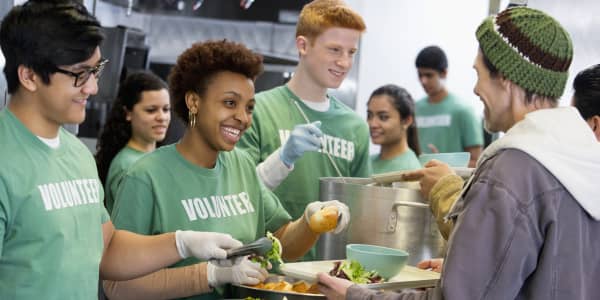The rich and famous — from celebrities to CEOs and pro athletes — love to give back as much as any Americans, and it's a nation that set a record last year for charitable contributions, according to the Giving USA Foundation.
But for every Bono attempting to save the entire planet, there are other celebrities targeting causes that might otherwise fly under the radar — issues in the communities where they were raised or with populations they once counted themselves among, such as at-risk children, minorities and military veterans.
"I'm like anybody else," said Kevin O'Leary, "Shark Tank" celebrity investor and founder of O'Leary Financial Group. "I want these investments to mean something to where it's going; I want to see my dollars work. But I think it's important for everyone to give back," he said.
Celebrities serve as spokespeople, boards members and executives for charities — and of course, giving back some of their riches. Notably, many celebrities make it a point to give all year long rather than just around the holidays.
Here are 10 members of America's VIP class on how they give back.
— By Angela Johnson, special to CNBC.com
Posted 27 November 2015
This story is part of NBCU's Season of Kindness. Follow the series on Facebook, Twitter and Instagram. #ShareKindness
Harry Connick Jr., musician and actor
Although it's been 10 years since Hurricane Katrina ravaged New Orleans, native son Harry Connick Jr. continues to work with Habitat for Humanity on the Musicians' Village, a neighborhood designed to preserve the musical heritage of New Orleans, which he and fellow musician Branford Marsalis first pitched in 2005.
Music has long been the heart and soul of New Orleans, and preserving the musical heritage of the city has long been a cause near and dear to musician and actor Connick Jr.'s heart.
"This is very exciting, because it uses the Habitat model — building homes and communities," said Connick Jr. in an interview on the Musician's Village website. "Children will grow up in the neighborhoods, in a safe and secure environment, and at the same time have the opportunity to become a part of the musical and cultural scene of New Orleans," he said.
New Orleans Habitat's Musicians' Village consists of 72 single-family homes, five elder-friendly duplexes, a toddler-friendly pocket park and the Ellis Marsalis Center for Music.
"I think it's really important to give back, and in my case I give back to my community in New Orleans," said Connick Jr. in an interview with CNBC. "I spend a lot of time raising awareness and money to keep this incredible facility in operation."
Mike and Maurkice Pouncey, NFL offensive linemen
Miami Dolphins center Mike Pouncey and his twin brother Maurkice of the Pittsburgh Steelers are two of the highest-paid centers in the NFL, each boasting $40-million-plus contracts. Yet despite their success on the field, life off the field hasn't always been easy for the twins.
Growing up on the tough streets of Lakeland, Florida, they met up with their fair share of challenges — and stress the impact of having a positive role model for guidance.
At 26, these NFL stars are vowing to promote the future success of disadvantaged youth through their foundation, Team Pouncey. Its mission: to provide leadership and growth opportunities, both socially and academically, for children at risk, especially abused and neglected children. These opportunities come in the form of free football and cheer camps and through a number of community events, such as its annual celebrity basketball tournament
To date, the twins have provided more than $10 million of impact to at-risk youth through its grants and programs for the kids in Florida, Miami, Lakeland.
Kevin O'Leary, founder of O'Leary Financial Group
Kevin O'Leary, the no-nonsense "Shark Tank" entrepreneur nicknamed Mr. Wonderful, has a simple, disciplined model for how he and his family give.
"I commit for five years to five institutions. My wife picks one of them, and I pick the other four," said O'Leary to CNBC. "We give the same percentage every year, we commit to it, and the reason I do that is I want accountability."
O'Leary is not only careful in his charitable giving model, he is also very specific in targeting themes within the biggest charitable-giving categories — such as education.
"In education, I'm huge for entrepreneurs, so I pick colleges that are pushing entrepreneurship — in engineering, primarily. I want to help those kids create companies. We've gotta compete globally," he said.
Larry Fitzgerald, Arizona Cardinals player
What started out as a way for NFL great Larry Fitzgerald Jr., Arizona Cardinals wide receiver, to give back to his community has grown into an international charity.
Fitzgerald's charity, The First Down Fund, was founded in 2004 and has made donations to refurbish a basketball court at Rev. Dr. Martin Luther King Park in Minneapolis, where he first played football as a child. "I always worked really hard to make sure my presence was felt in the community and trying to make sure I'm fostering the hopes and dreams of the youth the same way my dreams were fostered," Fitzgerald said in an interview with CNBC.
His philanthropic efforts now also span the globe. Fitzgerald has visited U.S. troops in the Middle East and helped fit kids in Africa and Asia with hearing aids.
"It's just a part of who I am," Fitzgerald said. "My mother raised us to always want to do things for other people. That's something she always did."
Mitch Albom, best-selling author
Best-selling author Mitch Albom has made charity a cornerstone of his life's work. Inspired by visits to his dying professor Morrie Schwartz — the central figure in the classic book "Tuesdays with Morrie" — Albom runs 10 charities, tackling everything from homelessness and hunger to mental challenges and meeting the needs of impoverished children and orphans in Haiti.
Last year, more than a dozen charities received over $400,000 in donations, raised in a mere 15 hours, from Albom's Detroit-based S.A.Y (Super All Year) Radiothon. The charities work with many groups, from veterans to single mothers, underprivileged children and the homeless.
"I got involved in Haiti right after the earthquake and wound up taking over an orphanage down there that was kind of limping along and very poor," Albom said in an interview with CNBC. "I've been there for the last six years, and I go down every month. It's that pure sense of actually something that really matters that draws me back there month after month. "
Among all of the lessons that Prof. Schwartz taught Albom, an important one is that "giving is living."
Bob Parsons, GoDaddy co-founder
For many the concept of giving back is centered on the holiday season, but GoDaddy co-founder Bob Parsons believes giving back is a constant endeavor. Through the charitable arm GoDaddy Cares, millions of dollars have been donated to charities, including The National Breast Cancer Foundation, Hope for Haiti and The Robotics Education & Competition Foundation.
The Bob & Renee Parsons Foundation also raised $5 million to help injured service members last year via the Semper Fi Fund. Parsons, a military veteran, served two tours in Vietnam with the Marines.
"We don't center our giving on the holidays; we do it all year long," said Parsons in an interview with CNBC. "We're giving right now about a million [dollars] every 10 days."
Janice Bryant Howroyd, founder and CEO of Act-1 Group
Janice Bryant Howroyd is the founder and CEO of Act-1 Group, the largest minority woman-owned employment agency in the U.S. and the first African-American female to own a billion-dollar business. She donates from a personal net worth estimated by Forbes to be over $600 million but also takes it one step further with employees of her company.
A new initiative, called "Uncaged," allows Act-1 employees to choose charities and then compete to have the company back their charity.
"We're not making a corporate decision about where we give in this instance," said Howroyd in an interview with CNBC. "We're allowing the team members of our organization to really explore where they want to give most, and we support them so they can give best."
Bert Jacobs, Life is Good CEO
Life is Good, an online retail company literally founded on the mission statement of spreading optimism, not only donates 10 percent of its net profits to help kids in need through its Life is Good Kids Foundation but specifically focuses on helping children deal with early childhood trauma through the foundation's Playmaker Initiative, which supports people who work with children in recovery from trauma.
But don't make the mistake of associating kids and kindness with a weakly run business.
"We want bang for our buck," said Life is Good co-founder Bert Jacobs to CNBC. "We want charities that are making a difference out there with results."
Kenneth Cole, founder of Kenneth Cole Productions
Making people look good is what fashion industry pioneer Kenneth Cole does, but when it comes to giving back, efforts by the fashion icon are more than just window dressing.
Last year, the Kenneth Cole company rolled out the Look Good, For Good campaign, which supported charitable projects under the three company pillars: collective health, civil liberties and artistic activism. "We try to make it inherent in our business model," said Cole in an interview with CNBC.
Kenneth Cole also has a charitable program in its retail stores to raise money in support of worldwide charitable giving. The program rewards customers that donate $10 online or in Kenneth Cole stores with a 20 percent discount off full-priced purchases.
"Giving back is something most companies look to do at certain times of the year. We as a company look to do it all year," Cole said, and that concept is being expanded. "We have a homeless drive that used to exist only in the month of February and only in certain cities. Going forward it's going to exist everywhere, all the time," he said.




